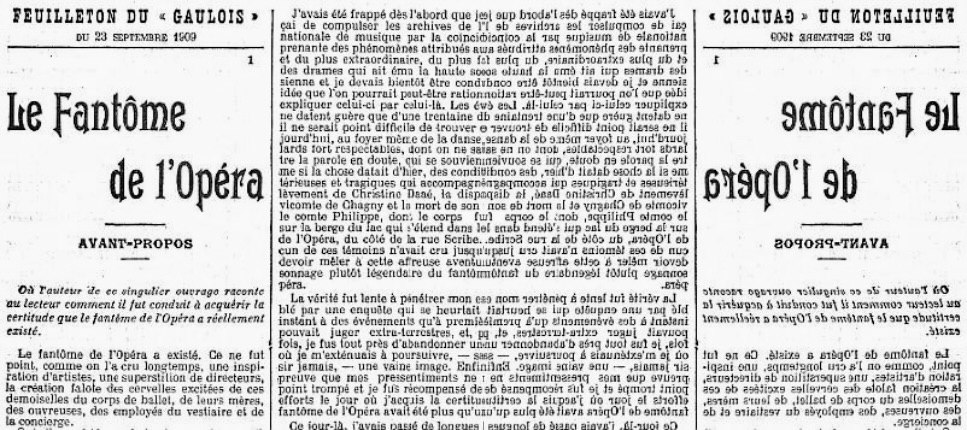TODAY: In 1909, Gaston Leroux’s The Phantom of the Opera is first published as a serialization in Le Gaulois.
-
Gloria Steinem on 50 years of Ms. Magazine: “A movement is a contagion of truth telling: at last, we know we are not alone.” | Lit Hub History
-
The right to read (in private): Anthony Aycock on the links between book bans and the FBI’s controversial Library Awareness Program. | Lit Hub Politics
-
All in the family: How Adrien Proust, father of Marcel, helped pioneer global health. | Lit Hub Health
-
“Long before the Poet jumped into the ocean, his luck had been meager.” Fae Myenne Ng on the Chinese Titanic survivors who were forbidden to disembark in America. | Lit Hub History
-
Anne Enright’s The Wren, the Wren, Jonathan Raban’s Father and Son, and Daniel Mason’s North Woods all feature among the Best Reviewed Books of the Week. | Book Marks
-
“I feared I’d become some kind of AI-literature evangelist in people’s eyes.” Vauhini Vara writes about her conflicted relationship with AI. | Wired
-
“Is there anyone more vain, more laughable, more exploitative yet morally self-serious than the novelist?” Jordan Kisner on The Fraud. | The Atlantic
-
Rebecca Mead considers how the Bloomsbury Group’s revolt against Victorian formality and gender norms continues to inspire fashion. | The New Yorker
-
“We worry about what it means to define certain content, such as LGBTQ content, as being inappropriate for young readers.” After their previous book was banned extensively, Mariko and Jillian Tamak discuss their new book, Roaming. | The Walrus
-
Chimamanda Ngozi Adichie on the books that changed her. | The Guardian
-
“Funny people are hotter than non-funny people and funny poets are the hottest people, period.” Chen Chen wonders what a “serious” writer is, anyway. | Poetry
-
“By the time of the American Revolution… the trickle of new words had become a flood.” On the evolution of American English. | Lapham’s Quarterly
-
The question of the year: Who needs plot when you have vibes? | Elle
-
Lynn Steger Strong profiles Karl Ove Knausgaard. | Esquire
-
“If he acts now with urgency and strength, he can replace the poison pill of carbon emissions with medicine.” Lydia Millet calls on President Biden to take “rational action” in the face of the climate crisis. | New York Times
-
“The words must create a grand harmonic music together. And yet the whole experience of an epic is composed out of thousands of individual verbal choices.” Emily Wilson walks through five tricky translation quandaries in The Iliad. | Washington Post
-
Saying goodnight to Goodnight Moon: Anna Rollins ruminates on the life of Margaret Wise Brown and postpartum health. | Literary Mama
-
Kristen Arnett on the “slurry of Florida Man content” online and IRL. | Vox
-
Gary Gulman, Maria Bamford, and Aparna Nancherla discuss the differences between writing for the page and for the stage. | Vulture
-
“Though she seems like a writer of details, each book is a vital mission, carried out with thrusting force.” Tobi Haslett on Annie Ernaux. | Harper’s
Also on Lit Hub:
Ross Gay pens an ode to footnotes • On the making of Larry McMurtry, chronicler of the American West • Against the tired trope of madness in fiction • On Alejo Carpentier’s The Lost Steps, a “book of voyages through space and time” • How digital platforms influence what we consume • 38 literary movies and TV shows to watch this fall • Anne Enright takes the Lit Hub Questionnaire • Mandy-Suzanne Wong on constructing new literary languages • The furious publication journey of Fire and Fury • Considering the pervasiveness of the Rothschilds myth • Why turtles are worth saving • Minna Dubin on parenting and the fantasy of joint custody • What makes language human • How the outdoors shaped the lives (and works) of women authors • Halle Hill on good women and the spirituality of girlhood • On the various feminist approaches to women in the military • Claudia Dey on the complicated allure of patriarchs • Erin Carlson recounts the tryouts for A League of Their Own • Read the winners of American Short Fiction’s 2023 Insider Prize
